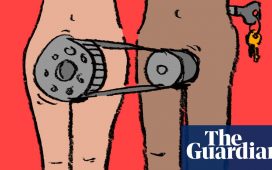In the weeks running up to my wedding, three years ago, I often found myself asking: what is the secret to a successful marriage? I did this, perhaps impertinently, even with strangers; and it was a stranger, on the Northern line, who gave me the answer that has stayed with me the longest: “Tolerance.” The friend I was with confessed afterwards that she had found this rather unromantic, but what the much older gentleman and his wife (who looked to be in their late 80s or early 90s) had said resonated with me. To tolerate is not to be a doormat, but to accept that the other person may not have the same outlook that you do, and that your behaviour and opinions may diverge. It is to be magnanimous, rather than seek to punish independence of thought.
Tolerance is difficult to practise at the best of times, but in lockdown it is even more of a challenge. Overnight, external support structures were stripped away, and many couples thrown into one another’s pockets. There have been reports of a global “divorce boom” following lockdown, and it is easy to understand why. During moments of crisis, we tend to take stock. Add confinement to the mix, and tensions have the potential to rise. Small arguments escalate and become proxy wars for bigger, unresolved problems. Many unhappy couples will have decided that they simply can’t bear it any longer.
For many younger couples, the pandemic will have represented their first major relationship challenge. According to the UK relationship support service Relate, more than a third of people aged 16 to 34 have struggled to emotionally support their partner through lockdown. I’m almost surprised it isn’t more. Lockdown was such a singular, aberrant scenario, a strange and emotionally exhausting rollercoaster. That two-thirds of younger couples feel they have done a good job of supporting each other is encouraging.
When you enter a long-term relationship, you know the potential eventualities: that you may face the challenge of parenthood together, that you will both lose loved ones, that financial hardships may come to pass. You know that there may be crying in the night. You know, unless you are very young, that you may end up caring for the other person into old age. But this was not something anyone predicted. I wonder how many relationships received a baptism of fire because of the pandemic.
The psychotherapist Esther Perel has been producing podcasts, webinars and newsletters throughout lockdown about the challenges it presents. In her newsletter earlier this year, she emphasised the importance of recognising that we all have different coping mechanisms. “Under acute stress, some of us become highly logical, others become highly emotional,” she wrote. In other words, we need to tolerate our differences in an emergency situation, too.
If you’ve been single through lockdown, this might all sound like whingeing. There are people who have not touched another person for many months, and that absence of human touch has real, profound emotional effects (this absence can, of course, exist in relationships too). At the same time, it’s important to acknowledge that relationships are hard. The lure of the fairytale is powerful, and has been amplified by influencer culture on social media. When it comes to celebrities, we see the romantic weddings and then the catastrophic relationship breakdowns, but far less space is devoted to the everyday challenges that couples face. Perhaps that’s why a video of the actors Will Smith and Jada Pinkett-Smith discussing the time their marriage nearly ended resonated so much online recently. Even if it did feel a tad choreographed, the honesty of the conversation and the visible emotion on display felt new.
Attitudes also seem to be changing among the non-famous. Not long ago, I worked on a piece about younger couples who had been to relationship therapy. I was encouraged by how open my interviewees were about having sought help. They still carried a slight stigma about seeking therapy, but far less than that our parents’ generation faced, for whom, one interviewee noted, marriage counselling was seen as a last-ditch attempt to save a failing relationship, and any problems were kept from the children. This new culture of openness about the lows as well as the highs can only be a good thing.
We are yet to see the effects of lockdown on relationships in the long term, but it won’t all be divorce and heartbreak. There have been new relationships and pregnancy announcements and marriage proposals. Some couples, free of the distractions of children and grandchildren, will have reconnected. I wonder how many people, faced with the genuine threat of a terrible disease, confessed their love to each other. How many others have come through a strange and frightening time loving their partner more than ever, certain they made the right choice?
It’s become a cliche to speak of “love in the time of corona(virus)”, an overused headline riffing off the Gabriel García Márquez novel. Love in the Time of Cholera is a book I adored as a moony-eyed teenager, before I understood that love came with its challenges, even though it was plain to see in the novelist’s words: “Together they had overcome the daily incomprehension, the instantaneous hatred, the reciprocal nastiness, and fabulous flashes of glory in the conjugal conspiracy,” Márquez writes. “It was the time when they both loved each other best, without hurry or excess, when both were most conscious of and grateful for their incredible victories over adversity. Life would still present them with other moral trials, of course, but that no longer mattered: they were on the other shore.”
• Rhiannon Lucy Cosslett is Guardian columnist














